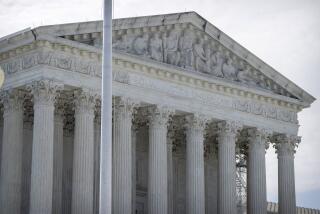Supreme Court blocks Texas abortion law from taking effect
- Share via
Reporting from Washington — The Supreme Court by a 5-4 vote blocked the state of Texas, at least for now, from enforcing a strict new abortion law that was likely to close most of the state’s remaining abortion clinics.
The measure would require these clinics to have doctors on staff who have admitting privileges at a local hospital. But in part because of the strong opposition to abortion, doctors have been unable to obtain those privileges in large parts of the state.
The law also requires these clinics to meet the standards of an outpatient surgery center. The combination of the two rules was expected to close all but nine of the state’s abortion clinics. There were 41 clinics operating before the law was approved in 2013; today, only 19 remain open.
The U.S. 5th Circuit Court of Appeals in New Orleans this month upheld the law as constitutional. Lawyers for the abortion clinics on June 19 urged the justices to delay any enforcement of these new restrictions while they prepare an appeal.
On Monday, abortion rights activists and providers heaved a sigh of relief that what they deem to be politically motivated and dangerous intrusions into women’s lives have been put on hold. Texas officials vowed to keep fighting a decision by the highest court that Atty. Gen. Ken Paxton said “just put Texas women in harm’s way.”
The law in question is HB 2, an omnibus package of abortion restrictions that Paxton said in a statement Monday “ensures abortion clinics and doctors meet basic health standards if they choose to operate their business in Texas. Today’s delay subjects Texas women to substandard care all to the benefit of the abortion industry’s bottom line.”
Gov. Greg Abbott had defended the abortion restrictions as Texas’ then-attorney general, and continued to support the restrictions after winning the gubernatorial election in November. He described HB 2 as “a constitutional exercise of Texas’ lawmaking authority,” and said in a statement Monday that he is “confident the Supreme Court will ultimately uphold this law.”
By issuing the stay order, the high court prevents Texas from enforcing the law. This will remain in effect “pending the timely filing and disposition” of the appeal of the lower court ruling, the court stated. The justices, however, will not meet again to consider the appeal petitions until the end of September.
The Center for Reproductive Rights, which sued Texas on behalf of several clinics, had sought the stay from the Supreme Court to gain some time and plans to appeal the 5th Circuit’s ruling within the next 90 days. Had the high court not acted, the restrictions would have gone into effect Wednesday, forcing the clinics to close.
“The justices have preserved Texas women’s few remaining options for safe and legal abortion care for the moment. Now it’s time to put a stop to these clinic shutdown laws once and for all,” said Nancy Northup, the center’s president and chief executive.
In a conference call with reporters, Northup said it was fitting that the justices acted on Monday, the 23rd anniversary of another crucial ruling, Planned Parenthood vs. Casey. In that case, the Supreme Court upheld a woman’s right to have an abortion but allowed states to place restrictions on the procedure as long as they did not create an “undue burden.”
That phrase has been litigated ever since.
Amy Hagstrom Miller is founder and president of the clinic network Whole Woman’s Health, which sued the state to block HB 2. She called the law a “thinly veiled attempt to make abortion unavailable and unaffordable by closing down clinics.” She also said Whole Woman’s Health is “committed to ensuring that Texas women know that abortion is still legal and, despite anti-choice politicians’ efforts, it is still available.”
The fight, Hagstrom Miller said during the conference call with Northup, “is far from over.... We are in it for the long haul, and today is a really good day.”
But NARAL Pro-Choice Texas Executive Director Heather Busby was less sanguine Monday. She called the justices’ emergency stay “a temporary victory” and said that it just “postpones a public health disaster.”
“If allowed to go into full effect, HB 2 will devastate access to reproductive healthcare,” Busby said in a statement. “Healthcare should not depend on your ZIP Code or your bank balance. We can celebrate this decision today, but the reality is that Texans’ health and safety are still in jeopardy.”
Beyond its effect on Texas clinics, the Supreme Court vote itself was significant because Justice Anthony M. Kennedy joined the court’s four liberal justices to grant the order.
If the high court takes up a constitutional challenge to abortion regulations, Kennedy will be seen as the deciding vote.
Chief Justice John G. Roberts Jr. and Justices Antonin Scalia, Clarence Thomas and Samuel A. Alito Jr. dissented.
Typically, the court grants emergency appeals when a majority of the justices thinks the lower court ruling may be in error and may cause real harm in the interim.
david.savage@latimes.com
Twitter: @DavidGSavage
maria.laganga@latimes.com
Twitter: @marialaganga
Savage reported from Washington and La Ganga from Seattle.
More to Read
Sign up for Essential California
The most important California stories and recommendations in your inbox every morning.
You may occasionally receive promotional content from the Los Angeles Times.















